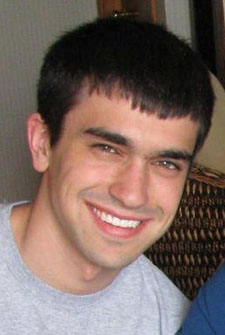Lucas James and David Bergsman share some similarities. Both are UW seniors, are majoring in chemical engineering, and both have been named 2011-12 Mary Gates Research Scholars.
The undergraduates were two of 96 Research Scholars (from about 250 applicants), who will receive $4,000 in scholarship funding this year. The Mary Gates Research Scholarships were established to provide undergraduates with funding so they can focus their energy and time on research projects. Faculty mentors guide the undergraduate students on these research projects.

David Bergsman works with Prof. John Berg and graduate student Matthew Gacek. David will use the scholarship to continue his research on the mechanism behind the charging of oxide particles in non-polar liquids. “I'm investigating how particles, when placed in liquids like oils, can pick up electrical charge like they do in polar liquids, like water,” David said. He will explore the importance of water for the creation of charge in non-polar media.
David feels this important research is, in part, the reason he was awarded the scholarship. “I believe that I was selected to receive this award because this research is critical to understanding how a variety of new technologies work, and how they could be improved. One particularly important example is the screen of the kindle, which uses charged particles in non-polar solutions as a key part of the design of its screen. By better understanding this technology, we can make improvements to these screens, hopefully making them cheaper to produce and more accessible to society.”
Mary Gates Scholars are invited to present their research at the Undergraduate Research Program’s Annual Undergraduate Research Symposium held in May. David plans to give his presentation on the correlation between water content in non-polar liquids containing OLOA 11001 (a specific mixture of surfactants), and the electrophoretic mobility of those solutions (an indicator of the amount of charge on those solutions), he said.
David hopes to continue his research after he earns his degree. “I'm currently planning on going to graduate school, and I hope to focus my research on creating new technology and innovations, such as investigating the use of surface-treated gold nanoparticles for the detection and removal of cancer cells.”

For Lucas James, his research focus is on solar energy. Working in Prof. Hugh Hillhouse’s group, he explores the use of nanocrystal-based inks as the light-absorbing material for thin-film solar cells. “ My responsibilities are two-fold,” said Lucas. “One is to determine the limiting efficiency and ideal band gaps of ideal solar cells under cloudy conditions and compare to the known efficiency limits under clear conditions,” he said. “I am also analyzing the reaction chemistry involved in synthesizing CIGS and CZTS nanocrystal-based inks for use in real corrugated-rooftop tandem solar cells, hopefully using the analyses to improve the synthesis and processing of such inks.”
The research happening in the Hillhouse lab also has far-reaching effects. “The research is capable of having a significant impact, as it deals with green energy. If we discover a better type of solar cell for use under cloudy skies, or if we develop low-cost methods of synthesizing high-efficiency cells, then this cleaner form of energy will become more popular, especially in Seattle.”
For his presentation at the Research Symposium, Lucas plans to showcase the results on the modeling of the traditional and corrugated-rooftop-geometry under cloudy conditions and any conclusions about improvements to efficiency.
After he graduates as one of the first students with the Nanoscience and Molecular Engineering Option, Lucas’s aims to go into industry and academia. “I plan on taking the next year or two off from school and work in industry,” he said. “I do wish to eventually go to graduate school and pursue an advanced degree in chemical engineering or a related field. I plan on doing more research in nanotechnology and/or molecular-scale chemical engineering while in graduate school.”